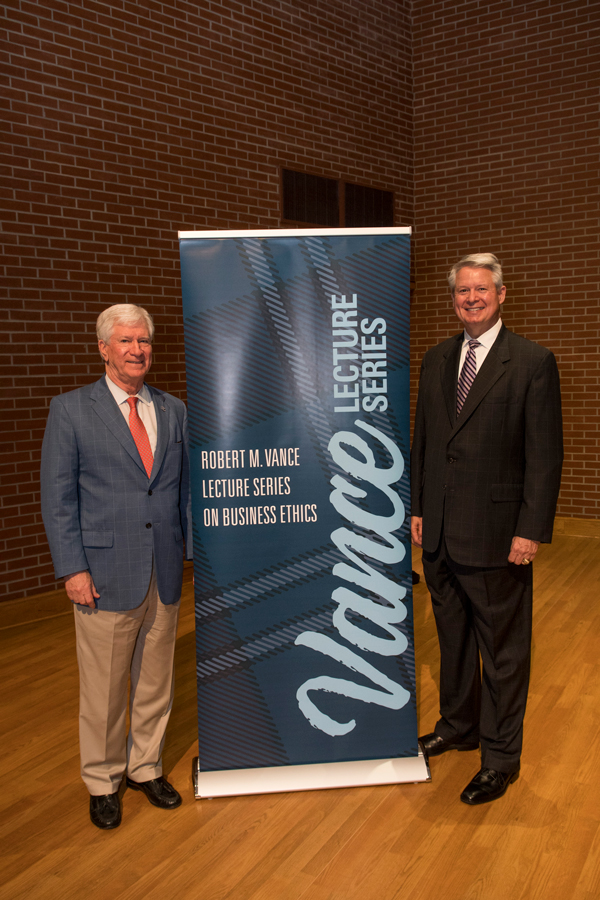Former Michelin Chairman and President Speaks about Leadership, Ethics

Pete Selleck, former chairman and president of Michelin North America, delivered this year’s Robert M. Vance Lecture on Business Ethics, “Your Reputation: Critical To Your Future.” The event took place on February 15 in Edmunds Hall.
Selleck spoke about situations in his military and professional career that presented ethical dilemmas. For example, Selleck told the true story about a time a manager was violating a company policy. The manager’s subordinates were faced with a choice: Should they report the violation? Or should they keep quiet because they’re afraid of what the manager would do if he found out who reported him?
“If you are a leader, you’ve got to understand that if you have subordinate leaders, they’re going to possibly see things that are wrong. They’re not going to have the courage to report it,” Selleck said. “It’s important that leaders create an environment where subordinates feel comfortable telling the truth. If they see something that’s not right, they need to say something.”
Selleck also shared what happened when a company commander issued a false report and another story about what happened when Selleck immediately reported a problem. Selleck spoke about the 1996 Firestone and Ford Explorer case to relay how it’s important to always treat customers with respect. And Selleck told the true story about one of his subordinates not accepting a bribe from a border patrol guard to illustrate that you should always do what’s right.
“Ethics and integrity are differentiators for companies and for individuals,” Selleck said. “If you’re an ethical person and people trust you, you will be surprised at how important that will be in your career.”
Always Be Prepared, and Other Important Lessons
The former Michelin chairman and president went on to share what he learned during his international business career. He told students in attendance that part of his success came from simply being prepared. Since Michelin is a French company, Selleck knew how important it was to learn to speak French.
“Mastering foreign languages and cultures helps you understand how people think,” Selleck said.
Selleck said his bachelor’s degree in engineering and MBA also made him well-prepared during his time at Michelin. Plus, his leadership experiences in the Army and at Michelin taught him how to serve others. Selleck said that being decisive, taking intelligent risks, and having fun further contributed to his success. And he said to always be prepared for change.
“Change is continuous, and continuous learning is essential,” Selleck said. “Never get too comfortable, especially when things are going well.”
The Importance of Good Character
Selleck shared his observations on character, ethics, and reputation too.
“It’s important to develop good habits when you’re young because those habits will carry you forward as you move on in your life,” he said.
Selleck said to develop good character even in small things.
“People will poor character may win in the short-term. You may see people cheat, lie, or do things they shouldn’t do and win in the short-term. But oftentimes they’re going to hit the wall,” he said. “But people with good character will win in the long-term, and that’s primarily because they can live with themselves.
“As a leader, the morale and culture of your organization are determined by what you accept. Leaders are responsible for setting the ethical standards for their organizations.”
Your Career Shouldn’t Be Your Top Priority
Selleck closed this year’s Vance Lecture on Business Ethics by sharing other tips for success that he’s learned over the years. He said a person’s life is much more than his or her professional career. Selleck said it’s important for a person to find what they’re passionate about. He said that simply focusing on a career or making money is “fraught with danger.”
“There is no correlation between income and happiness,” Selleck said. “The top priorities, I believe, should be your purpose, which is basically what you want people to say about you in your life. It’s basically what kind of life you want to live. Your next priorities should be your family and your friends, your health, and then your career.
“I think it’s also important to focus on other people. If you’re a leader, you should be a servant leader. You’re here to serve people,” Selleck said. “You’re not a leader because you’re better than other people you’re in charge of. You’re a leader because you have certain talents and responsibility to serve the people that are working for you.”
Selleck closed his talk by passing along the advice that his father gave him when he was going off to West Point.
“He said, ‘First of all, always do your best.’ Never be afraid to get out of your comfort zone because that’s how you grow,’” Selleck said. “‘Keep a low profile.’ It’s about humility. It’s not always about us. ‘And maintain your sense of humor.’ Things are going to go wrong. Your ability to be resilient and offset that by laughing is a really good thing.”
